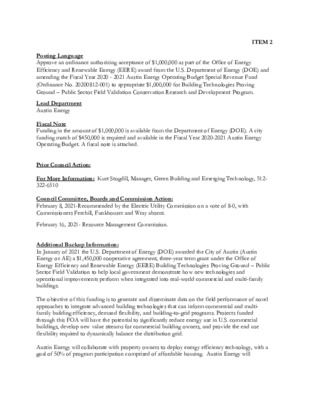Item 2: RCA Building Technologies Grant — original pdf
Backup

ITEM 2 Posting Language Approve an ordinance authorizing acceptance of $1,000,000 as part of the Office of Energy Efficiency and Renewable Energy (EERE) award from the U.S. Department of Energy (DOE) and amending the Fiscal Year 2020 - 2021 Austin Energy Operating Budget Special Revenue Fund (Ordinance No. 20200812-001) to appropriate $1,000,000 for Building Technologies Proving Ground – Public Sector Field Validation Conservation Research and Development Program. Lead Department Austin Energy Fiscal Note Funding in the amount of $1,000,000 is available from the Department of Energy (DOE). A city funding match of $450,000 is required and available in the Fiscal Year 2020-2021 Austin Energy Operating Budget. A fiscal note is attached. Prior Council Action: For More Information: Kurt Stogdill, Manager, Green Building and Emerging Technology, 512- 322-6510 Council Committee, Boards and Commission Action: February 8, 2021-Recommended by the Electric Utility Commission on a vote of 8-0, with Commissioners Ferchill, Funkhouser and Wray absent. February 16, 2021- Resource Management Commission. Additional Backup Information: In January of 2021 the U.S. Department of Energy (DOE) awarded the City of Austin (Austin Energy or AE) a $1,450,000 cooperative agreement, three-year term grant under the Office of Energy Efficiency and Renewable Energy (EERE) Building Technologies Proving Ground – Public Sector Field Validation to help local government demonstrate how new technologies and operational improvements perform when integrated into real-world commercial and multi-family buildings. The objective of this funding is to generate and disseminate data on the field performance of novel approaches to integrate advanced building technologies that can inform commercial and multi- family building efficiency, demand flexibility, and building-to-grid programs. Projects funded through this FOA will have the potential to significantly reduce energy use in U.S. commercial buildings, develop new value streams for commercial building owners, and provide the end use flexibility required to dynamically balance the distribution grid. Austin Energy will collaborate with property owners to deploy energy efficiency technology, with a goal of 50% of program participation comprised of affordable housing. Austin Energy will collaborate with energy aggregators working in the multifamily space, energy technology and installation service providers to develop and deploy equipment in existing properties. Austin Energy will collaborate with non-profit organizations working to advance energy used by buildings through research and education. New partnership agreements will be necessary to work with energy aggregators working in the multifamily space and non-profit organizations capable of complex data analysis, independent third- party review of results, and development of educational materials. New agreements will be necessary with community ambassadors to ensure the rebate program development is developed in collaboration with and shared with the communities we aim to reach with this program. Austin Energy expects to update approximately 1400 multifamily units with technology that supports energy efficiency and demand response capabilities. Austin Energy plans to deploy technology capable of remote control of HVAC, water heating and potentially other electric devices within rental units. The technology will also provide the property manager with a virtual meter to reduce energy use in vacant units and enable alerts on malfunctioning electric-using equipment and excess energy use. At the end of the grant period, the work in Existing Buildings will be transitioned to the Energy Efficiency Services Multifamily Team, and the lessons learned will be transitioned to the Austin Energy Green Building team for codes and new construction recommendations. This grant application is one effort Austin Energy is working on to create solutions to address historical challenges and community concerns regarding the split incentive in affordable rental properties and the energy burden experienced disproportionately by communities of color in Austin. The split incentive challenge occurs when tenants pay the energy bills and the building owners have no incentive to pay for energy efficiency upgrades. Strategic Outcome(s): Government for All